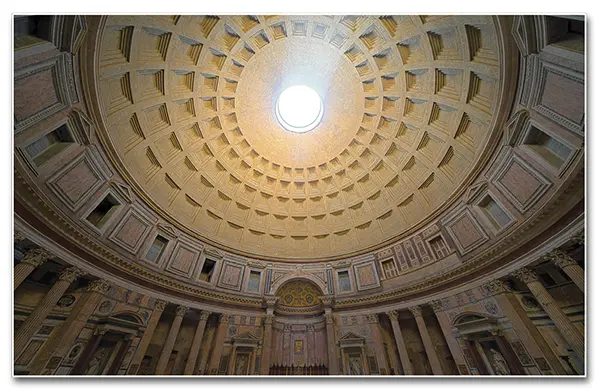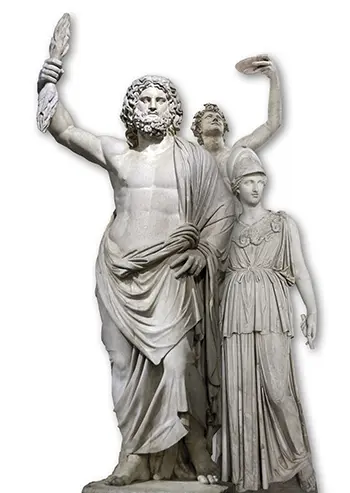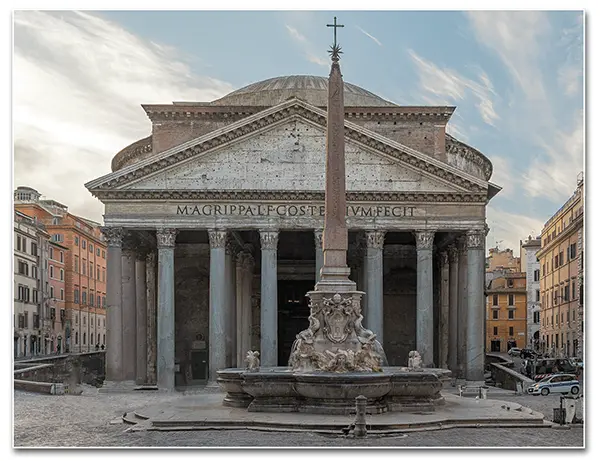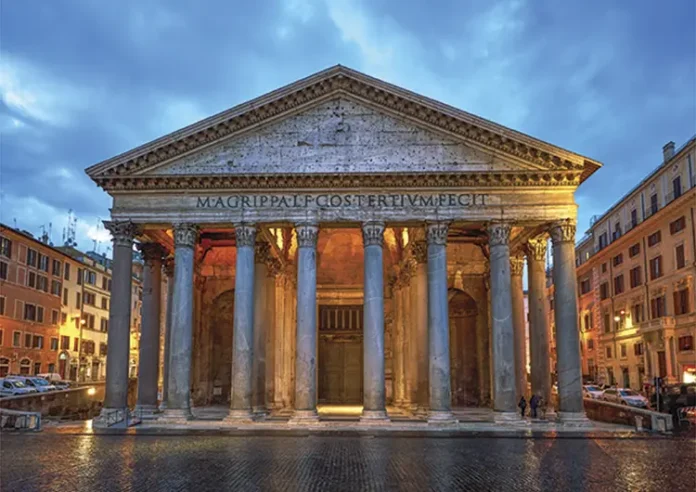By Jupiter, what a good idea Vipsanius Agrippa had when he built this temple! The Pantheon: what majesty, what conviction, what strength! And – between you and me – what a masterstroke… Agrippa well deserves to have his name engraved on its portico.
“Dignus Roma locus, quo deus omnis eat – Rome is a worthy place for all the gods to gather,”1 sang the poet Ovid. Yes, and in this Roman Pantheon, the truce of the Olympians was finally signed.
Despite its age – we are now over a century after its construction – this jewel still shines with youthful vigour. The sun has not faded the multi-coloured marble, the bronze doors have withstood the ravages of time, the sixteen monolithic columns support, as elegant and powerful as the arms of our athletes, the dome covered in silver plates.
And the interior holds an even greater marvel. Let us enter! Let us enter, for this is the right of all Roman citizens. The floor is marvellous, its polished stones reflecting the sun, which pours in through a nine-meter-diameter opening. The dome… There we have a veritable sky of stone. At 43.5 metres in height and 43.5 metres in diameter, the ceiling forms a perfect hemisphere, resembling the celestial vault.

But let us take our eyes off the sky and turn them to the gods. They, like us, are on earth. Each of the numerous niches houses a divinity. There stands Minerva Chryselephantine, mother of the happily reigning Emperor Domitian. Beside her, Jupiter the Avenger threatens to tear the clouds into lightning bolts and mortals into pieces. Venus, a little further on, displays jewels that are particularly earthly, for they belonged to Cleopatra. Bacchus, in his corner, laughs drunkenly.
They once bore different names – like Athena and Zeus – but also present here are those who declined the change of title and who nevertheless make up this intercontinental committee: the Phrygian Cybele; the Phoenician Astarte; the god Attis; Baal, the Syro-Phoenician infant-slayer; an Egyptian delegation presided over by Osiris-Serapis, accompanied by his spouse, Isis; Mithra, the Persian patron of light; Adonis of Byblos; Tammuz; Malakbel of Palmyra; Dushara the Arab… along with a few other imported deities.

As you can see, Asians are in fashion; this, in fact, was what prompted Juvenal’s conservative and satirical grumble a few days ago: “Iam pridem Syrus in Tiberim defluxit Orontes – The Syrian river Orontes has long since flowed into the Tiber.”2 That day, a discussion worthy of Mars’ presidency took place in the Senate. But diplomacy prevailed. Or rather, faith…
Here in the Pantheon, however, peace reigns, thanks to the engineer who designed it. This perfect circle was created to avoid any dispute between the gods: none of them holds a higher position. Moreover, there is no centre. The place toward which they turn is reserved solely for humans. What can we do? It is the only way to bring them all together.
All… except one. One who would not resign Himself to this condition of equality. He is the God of Christians! And when, the other day, we discussed the mass immigration of eastern gods, this Jesus Christ was barred entry. We are, in fact, aware of at least two crimes He perpetrated against the society of men and gods: exclusivism and radicalism.
Exclusivism: He is proclaimed as the only divinity by His followers. If He were content, at least, to be the first among the first, like Jupiter, we would still tolerate Him. But no! He is not one among others; He is the only one, Christians repeat.
Radicalism: He teaches meekness, chastity, detachment from earthly goods, faith in eternal life, belief in a final resurrection; worst of all, this doctrine translates into works. If He did not preach continence, the hedonists would worship Him; if His law had no practical expression, the philosophers would praise Him; if He did not speak of a resurrection, the Stoics would have believed in Him.

The conclusion was more than simple: Domitian, our august Caesar, decreed the persecution and death of the Christians. Unless, of course, they abjure that creed in favour of a more moderate position. Moderation… is fundamental. A religion that believes itself to be true has no right to exist. A single, infinite God has no place in the Pantheon, especially when He brings with Him a morality.
* * *
These were the thoughts that filled the mind of a Roman patrician during the second persecution launched against the Catholic Church in 93 AD, the year in which, once again, the pagans realized that this religion could not mix with others. What did all this result in? Centuries of syncretism, more diplomatic than sincere, crumbled under the blood of Jesus Christ’s disciples, and the prison of ancient and false divinities, the Pantheon yielded its columns to the Church of St. Mary and the Martyrs. The one God had won.
But this Roman, who existed under the name Tacitus, still exists today, perhaps unconsciously, deep down inside those who desire the return of the Pantheon and, therefore, the ruin of the Church. ◊
Notes
1 OVID. Fastorum. L.IV, v.270.
2 JUVENAL. Satira. L.III, v.62.



Appreciate the thorough breakdown. This is high-quality content.